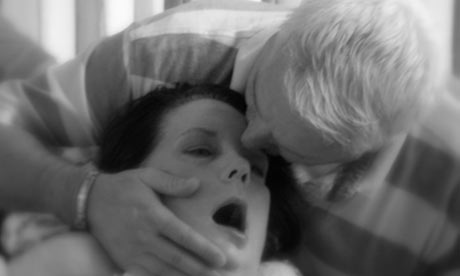
It hurts physically when we run into opposing forces (tables, chairs, walls, players for a rival sports team) with the outside of our bodies. But, it also hurts immensely on the inside when our values or morals collide.
I've been experiencing this torturous feeling for several months in regards to my dear, dear wife Nancy. I selfishly want to have her for as long as I can possibly hold on to her. But then I imagine how horrendous it must be for her to live with Lou Gehrig's disease (also known as ALS), imprisoned inside her own body as her mind stays nimble, but her body deteriorates and stops responding to her wishes.
An internal battle wages within me. Prying my heart's fingers from around her heart is one of the most difficult things I've ever experienced. Nancy's vital signs remain positive with no infections. She occasionally, although rarely, opens her eyes and communicates minimally by blinking. Our health is such a blessing when it is good. These days, we take what we can get.
Ironically, these past two weeks the Terri Schiavo case has been one of the focal points of the "discussion board" in my paralegal training class. You may be familiar with this highly publicized case about a young lady who was on life support for over 15 years with little or no hope for improvement. Her husband said Terri had personally discussed with him the fact that she did not want to remain on life support in circumstances like the one she was experiencing. Her parents, very naturally, had a strong opposing view.
There was a major problem because they had never completed a medical directive and thus, the "clash of the titans" occurred. First, may I plead with everyone that if you have not completed medical directive, a power of attorney and either a will or trust, please, please do so. I don't know what the equivalents are in other countries, but I suspect there are similar types of measures. I'm not an attorney offering you legal advice, but I am offering advice from personal experience.
If we do not complete these legal documents we risk abdicating our rights to choose what we would want done for ourselves to a court system which will assign someone to make decisions for us and our family. As well intentioned as the assignor may be, they may or may not choose what we would desire. This could cost our family legal and/or probate fees, not to mention a lot of disharmony and grief. So, please take care of that immediately, because unfortunately, like life insurance or a life vest, no one can anticipate when they will need it until often it is too late.
Even though the above recommendation, which you can probably tell I have strong feelings about, will take care of many, if not most, circumstances, we still may run into some situations in life that these documents may not take care of.
For example, in our current situation my dear wife did complete a medical directive and made it very clear that she did not want to be resuscitated (that is, she did not want her heart restarted if it stopped). However, she also stated that she did not want to be taken off of her ventilator. I feel reasonably certain this was due to a near-death experience she had approximately three years ago, 10 months after her ALS diagnosis.
One night she was not getting adequate air, her face had begun to turn ashen gray and her lips deep purple until I began to "ambo bag her", which I continued to do until the 911 paramedics arrived. It seemed very clear, "cut and dried" some might say, what her wishes were. But, the key word here is "were".
It occasionally occurs to me that she did not know back then what she knows now. If she would have known three years ago that she not only would be unable to move (a given for most ALS patients), but she would also not be able to communicate in any way and that she would not be able to open her eyes, would she have made the same choice?
I honestly do not know, and it gives me pause and occasional anxiety. This is not a decision I thought I would ever face – to hold someone's life almost in my hands. The dilemma now is there is no way for her to let us know if she does want to change her mind. As her medical proxy/partner I can only do, in clear conscience, what she last communicated to me that she wanted done for herself. So, "checkmate".
I am a religious person, and I pray daily for God's mercy and grace upon her and that his will be done. Beyond that, I feel helpless. Doctors and nurses, for all their knowledge, cannot make these decisions for us. But, until the time comes that God takes her, my family and I will do everything earthly possible to make her remaining days on this earth as peaceful and comfortable as possible.
I pray you will never face a crisis like this in your life. But if you should, remember my story and the three years I have been more or less by my wife's bedside: talk with your partner in advance and be as clear as possible about your desires. Get your legal affairs in order and, if it applies to you, have your spiritual affairs in order as well. No one likes to think much about end-of-life decisions, but there are legal and moral quagmires to deal with on top of the emotions.

